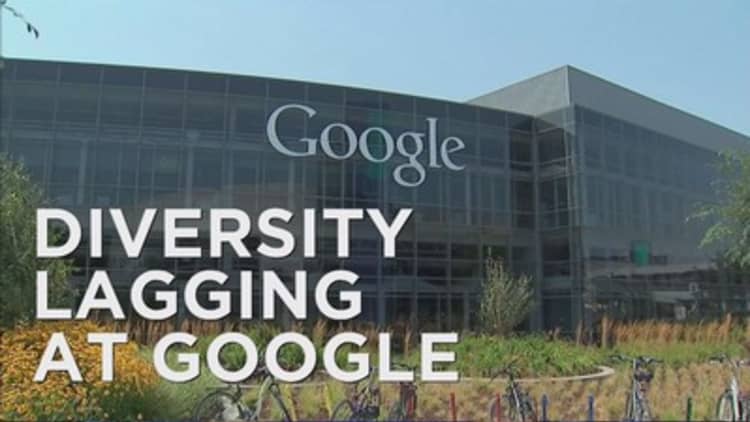The technology sector is in the midst of a raging debate about whether its leaders have done enough to ensure a diverse workforce.
Yet those efforts are falling well short of the mark, leading some experts to argue that companies are faltering because they lack deep understanding of their workforces, as well as the populations they serve.
Earlier this month, the Congressional Black Caucus's (CBC) Diversity Task Force met with Silicon Valley tech leaders to push for more African-American representation in the field.
The meeting was part of a sustained effort to boost the representation of blacks, Hispanics and women among technology workers. It's become a hot topic that has put industry leaders like Google and Apple on the defensive even as the sector sits on record profit of nearly $135 billion collectively.
To be sure, the conversation hinges largely on how diversity is defined. Organizations like Working Partnerships USA point out that tech's "invisible workforce"—the plethora of nonskilled support jobs outside of engineering and coding—is in fact balanced, but mostly underpaid.
However, at least a few observers argue that some workplaces are growing in diversity, yet don't fully appreciate their workers' abilities, or their target markets. Along those lines, experts say both companies and diversity advocates might be misapplying the lessons of diversity.
Read MoreThe toys that could help close Silicon Valley's gender gap
"We define cultural competence as the ability to interact effectively across difference," said Sara Taylor, founder and president of deepSEE Consulting, a diversity and cultural competency consulting firm.
"It's not just about diversity; it's about what we do to utilize it," she said. "It's like having a giant treasure chest—do you know how to unlock it? You need competence to unlock it."
Not just a 'nice, moral' thing
The debate has grown in importance as demographic trends make diversity something that all businesses have to negotiate. Recent Bureau of Labor Statistics data showed that people of color make up a third of the workforce, a figure that is likely to grow.
Ensuring a workforce that is more representative of demographic realities is a problem that defies easy explanations and solutions. Still, evidence suggests that in instances where diversity exists, the outcomes aren't what some might expect.
Read MoreSilicon Valley 'needs guidance' to boost diversity: Entrepreneur
In a 2003 study, Switzerland's IMD Business School professor Joseph DiStefano explored the impact of cultural diversity on business performance, and found that teams with conventionally defined diversity were often less productive than groups with shared backgrounds and values.
DiStefano noted that differences in culture, leadership style, personality and gender can pose challenges to high performance. The findings suggested that cultural competency—demonstrating deep knowledge of and appreciation for a population or demographic—is key to ensuring that diversity translates into the best results.
"This isn't just a nice moral thing; this is what we should be doing to make us more effective," said Charles Zelle, Minnesota commissioner of transportation, who went through deepSEE's cultural competency training.
"A common theme when I talk with my group of business leaders is that without doing this we'd be out of business," Zelle said. "It's about how we treat people—clients, the public and employees. It's essential to the business and mission."
Even advocates of a diverse workforce acknowledged that the solution wasn't as easy as it seems to some. "If everyone agrees that a diverse workplace is more productive why haven't we seen it implemented? I think people intellectually understand it, but it's difficult on the emotional level," said Center for American Progress fellow Sam Fulwood.
"If you told a CEO that a new type of machinery would make their business more productive they would buy it immediately," Fulwood said. "Diversity provides the same increase in productivity but causes a disruption. People need to be willing to manage the disruption that comes with managing change."

Another barrier in learning cultural competency is that most people self-assess their understanding as much higher than it actually is.
"There are a lot of myths around this work, the biggest two being that identity equals competence, that you have to be a woman or person of color to be culturally competent," said deepSEE's Taylor. "The other is that exposure somehow equals competency. We don't expect exposure to become competency for anything else. I can hold a violin for hours but that won't teach me how to play it."
The implications of the diversity debate are clear to most business executives, who polls show broadly agree with the idea that a balanced and inclusive workforce is important to innovation. For many experts and industry leaders, the nagging question is how to make it a reality.
"The nation is undergoing demographic change—the most informed and progressive businesses on diversity will be tapping into a changing democracy and they will be the most profitable, the others will be lapped," said American Progress' Fulwood.

